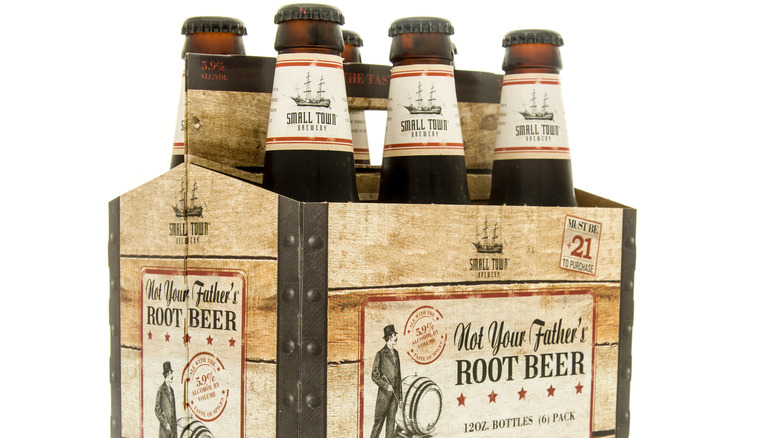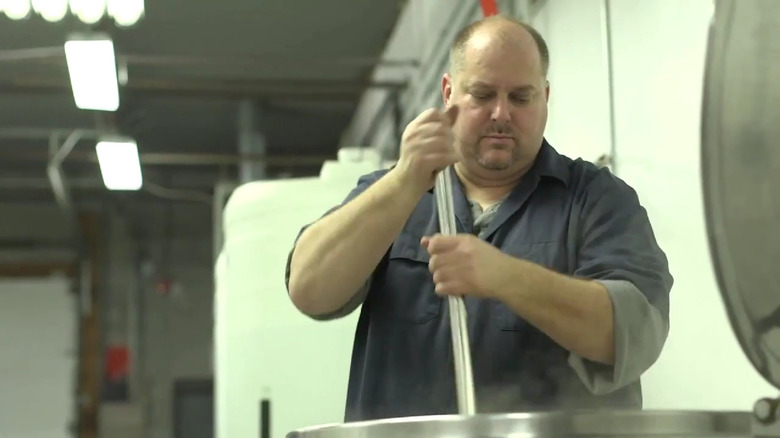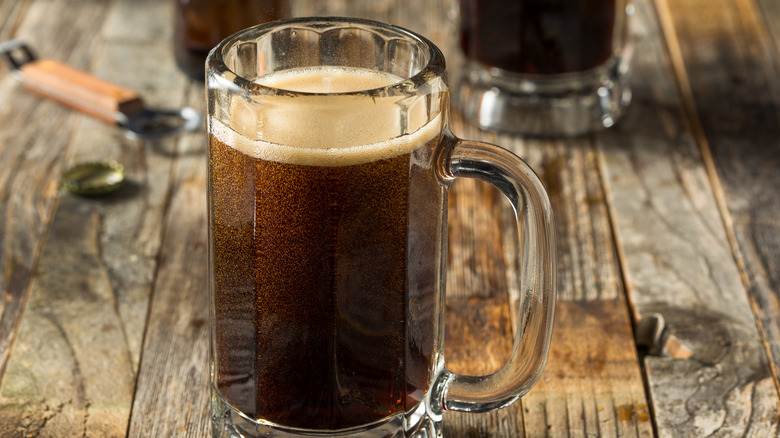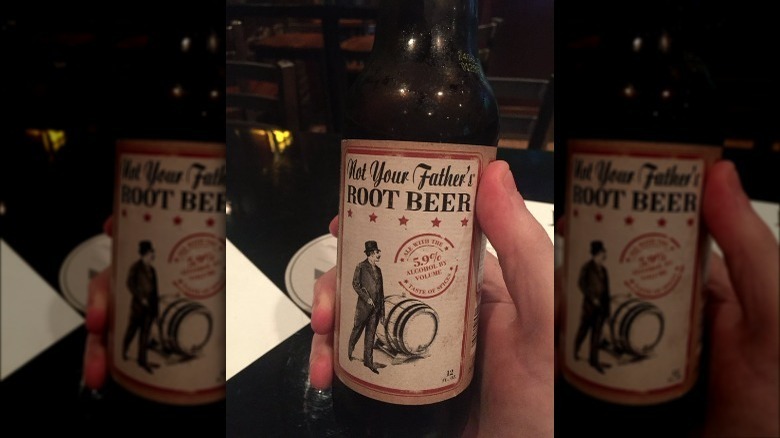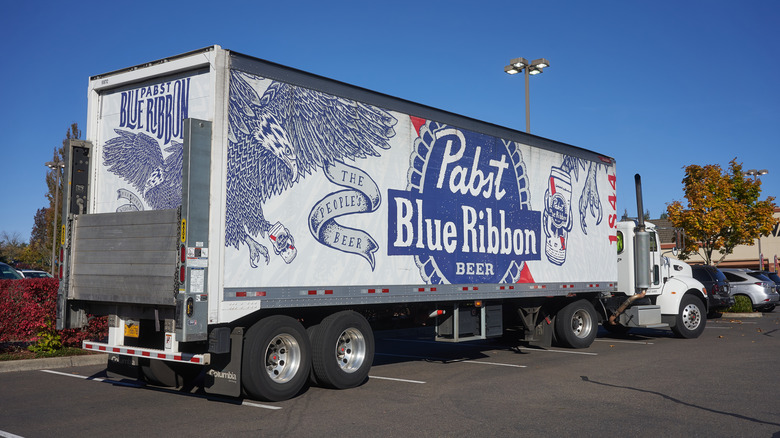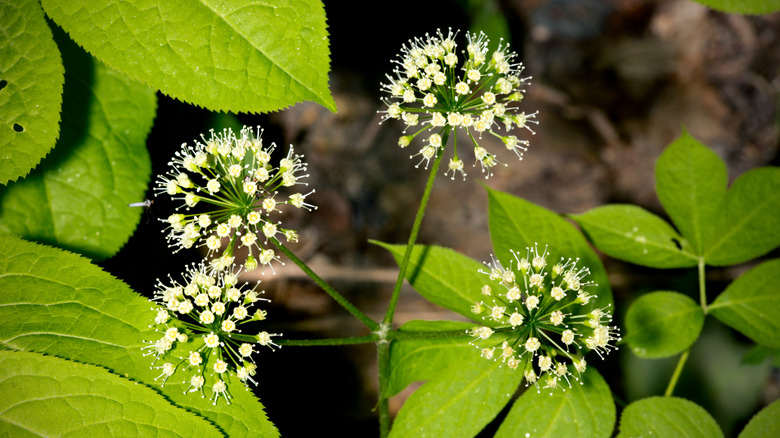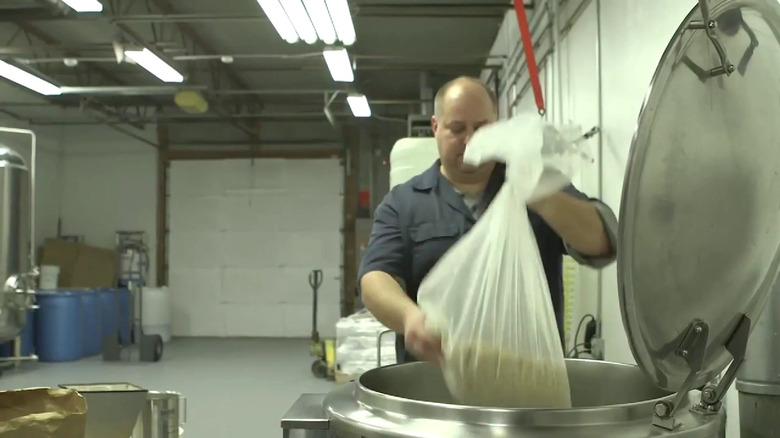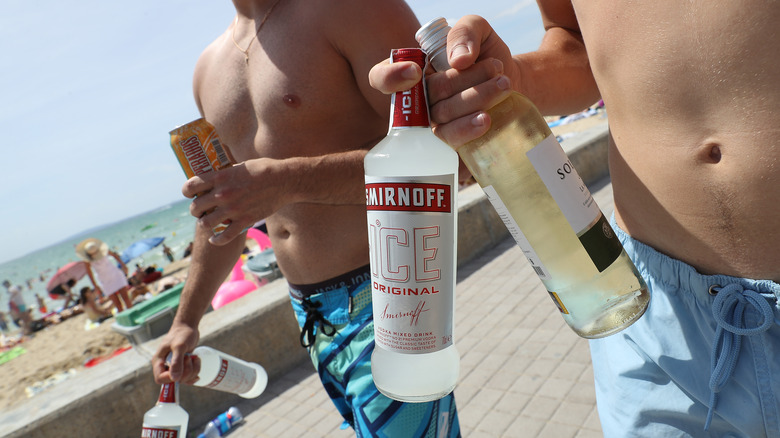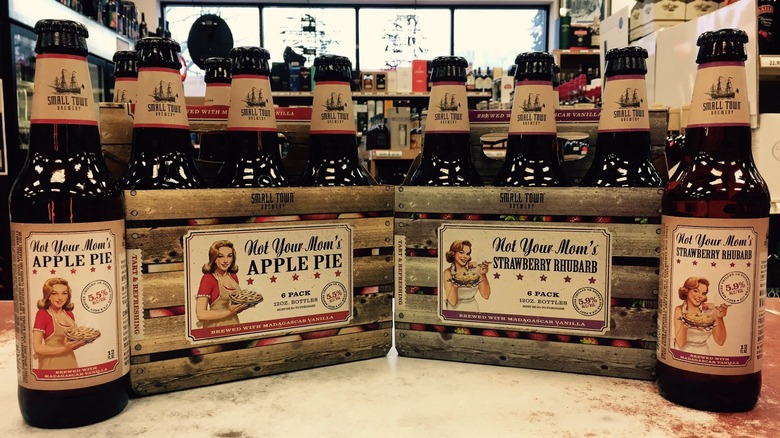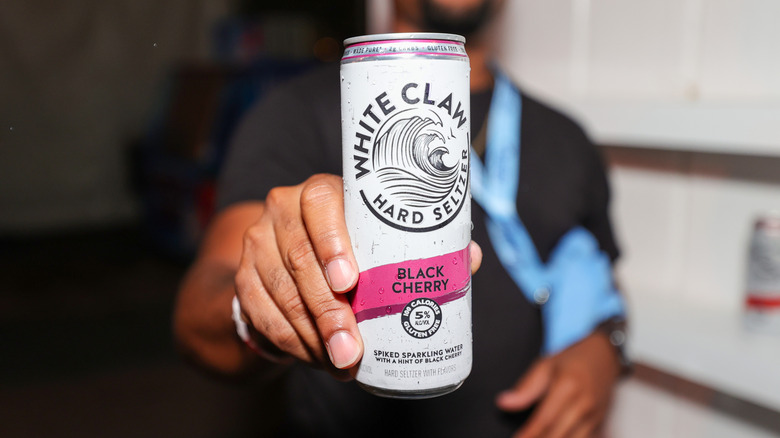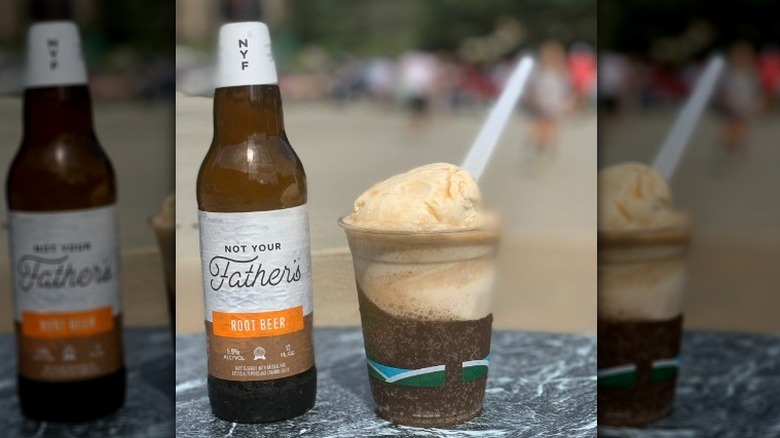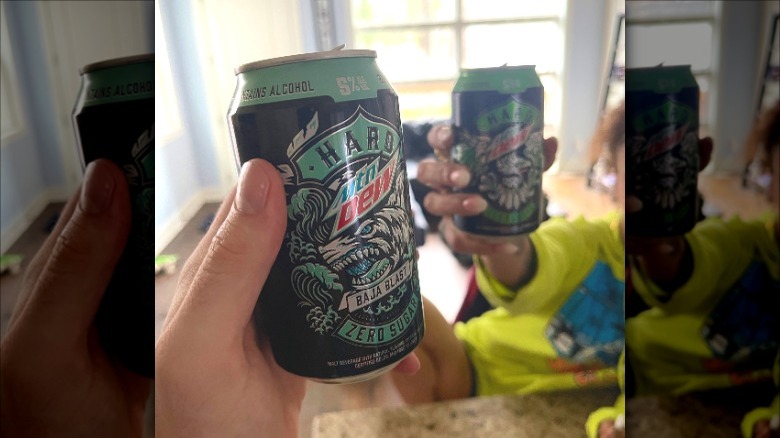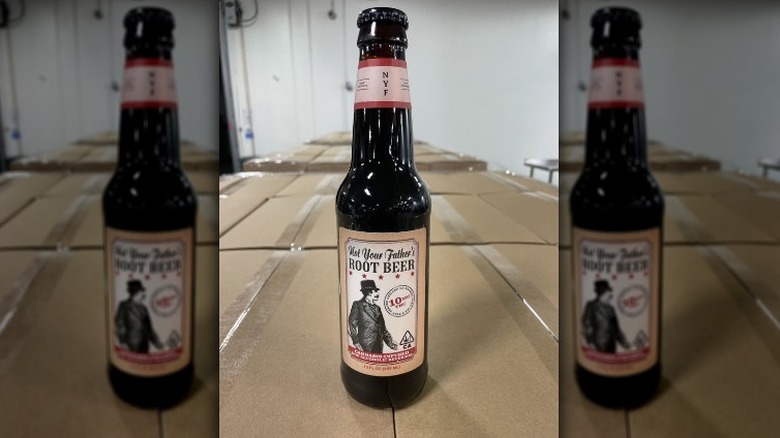Not Your Father's Root Beer: Everything You Need To Know
Once such a safe and predictable bet, the United States' beer market has become increasingly unpredictable (via Seven Fifty Daily). While this has led to many damaging consequences, such as overpowered distributors (per The American Prospect), the growing market for craft beer — when coupled with increased competition — has seen American brewers innovating at a previously unseen rate. The result has been an exciting new array of American beers hitting both national and international shelves from the early 2010s onwards (via First We Feast). One such beer was Not Your Father's Root Beer from Illinois' Small Town Brewery. This sweet, so-called hard soda rocketed to prominence in 2015 and became a seemingly ubiquitous part of American drinking culture overnight (per The Washington Times).
Despite successfully kickstarting a new subsection of the alcoholic beverage market — the hard soda — Not Your Father's Root Beer has struggled in recent years, due in part to health concerns surrounding sugar intake and the astronomic rise of hard seltzer, such as White Claw (via Eater). However, Not Your Father's Root Beer fought back with a rebrand in the hopes of regaining its once immense popularity (per Craft Brewing Business). What the beverage cannot change is its past, which is equal parts success and controversy. From the use of strange ingredients to accusations that the drink is not beer at all, there is a great deal to learn about what was at one time the hottest drink in America.
Tim Kovac invented Not Your Father's Root Beer
Tim Kovac co-founded Small Town Brewery in 2010 (via Market Wire), but his love for brewing goes much further back to 1988 when Kovac started homebrewing (per Beverage Industry). Kovac attributes the invention of Not Your Father's Root Beer to his son Jake, whose initial idea for a hard root beer took over a year and a half to hone into a finished product, as noted by the Chicago Tribune. It was exceedingly strong, however, and Kovac spent considerable time lowering the ABV until it resembled that of a quaffable beer. When he did, turning out three variations — 19.5%, 10.7%, and 5.9% — the stage was set for a new chapter in craft brewing.
As reported by the Chicago Tribune, distribution began in small pubs and restaurants around Wauconda, Illinois where Small Town Brewery was based. The beer rapidly gained popularity, which led Kovac to attempt a few small-scale bottling runs. The results again were exciting. Here was a beer that had sprung out of nowhere and was doing the near impossible, proving a smash hit with the public while also being accepted by beer aficionados. The latter were wholeheartedly besotted with the beer. The 5.9% version received a score of 89/100 from Beer Advocate, while the 10.7% would go on to be awarded an outstanding 94.
Not Your Father's Root Beer created a new alcoholic beverage category
The surprising and absolute popularity of Not Your Father's Root Beer blindsided both the mainstream beer and craft beer industries. In fact, it was rare for any drink, let alone a beer from an unknown brewer, to cause this kind of market response. The only comparable event being the sudden rise and abrupt fall of alcopops (per Eater). Unsurprisingly, Small Town Brewery was keen to distance itself from the alcopop boom and bust image, choosing instead to strongly identify its product as belonging to the popular, yet relatively stable, craft beer movement, according to CSP Daily News.
There had been other small-scale producers of so-called hard sodas, but it was Not Your Father's Root Beer that first managed to fully tap into the American public's desire for hard sodas (per Beer Advocate). The beer's success in traditionally non-beer drinking demographics (via Hype Group) opened the industry's eyes to the fact that hard sodas could mean huge money thanks to the product's widespread appeal. With this knowledge becoming increasingly apparent with every passing day, both competitors and imitators worked hard to release similar alcoholic root beers. These included Coney Island's Hard Root Beer and Anheuser-Busch's Best Damn Root Beer. Kovac didn't seem to mind the competition, saying to CSP Daily News, "There are a lot of copycats coming out. It's shining the light on our side, which is great because we got there first!"
Small Town Brewery products were available in the U.K.
In 2016, it was revealed that Small Town Brewery was sending its products across the pond, having seen a potentially keen consumer base in the United Kingdom. Not Your Father's Root Beer was distributed to the U.K. by Charles Wells, an independent British brewery (per Wells & Co). Tim Kovac, the founder of Small Town Brewery, was very excited about the partnership, stating, "Charles Wells' long history of quality and innovation is a perfect fit with our own company values. They've successfully introduced new varieties of beer to brand new markets, making them an excellent partner to help translate the success of our botanical brews across the Atlantic" (via Beer Today).
Unfortunately, the U.K. proved a hard nut to crack, and increased competition back in the U.S. meant that Small Town Brewery's overseas expansion saw limited success. This fact came as a surprise to many, given that the U.K. has a proven penchant for alcoholic sodas as typified by the continued success of Scotland's Crabbie's (per The Drinks Business).
Small Town Brewery partnered with Pabst
Upon the wider release of Not Your Father's Root Beer, Small Town Brewery was swamped with demand. Furthermore, owner Tim Kovac was struggling with how to get the beer distributed across the entire United States. A deal with the enormous and well-known drinks company Pabst seemed like a no brainer to Kovac. He said at the time, "I still own the brewery and pretty much get to operate it the way I was before. The advantage was, I wanted to get my beer out to the East Coast and the West Coast. Pabst made that possible" (via CSP Daily News).
Not only did Pabst take on distribution, but it also tackled marketing. For all this hard work, Pabst was rewarded with a company-wide sales increase of one-fifth (via The New York Times) — a success which eventually led to a general takeover of the brand. Rick Witt, a business partner in Small Town Brewery, spoke of the decision somewhat ruefully to The Chicago Tribune, saying, "If we were more seasoned, we probably would have done things a little differently. Our collective minds and our lawyers thought we'd set up something good."
Small Town Brewery has since been closed. Kovac is now running Spirit Water, another beverage company that makes wines and liquors alongside a multitude of beers (via Spirit Water).
Some unusual ingredients are used to flavor Not Your Father's Root Beer
Tim Kovac has long quoted gruit-style beers as his inspiration behind Not Your Father's Root Beer (via CBS News). Gruit is a common term for ingredients — such as herbs — that are used to flavor beer in place of hops. This method of flavoring beer is thought to be one of the oldest (per The Guardian) and offers an exciting array of flavor possibilities. Kovac's recipe is, as expected, a secret, but he did reveal to Beer Advocate some of the interesting ingredients used to create that classic root beer flavor. "Our unique flavor comes from ingredients including sarsaparilla, birch bark and Madagascar vanilla, as well as natural botanical extracts like oak, ginger, wintergreen, licorice, honey, citrus and mint," he shared.
The use of herbs is of particular note in gruit-style beers, as, in the past, they not only provided flavor but also a range of mind-altering effects (per Craft Beer). These types of effects are minimal in modern-day gruit beers, and their ingestion has a similar effect to hopped beer.
It has been questioned whether Not Your Father's Root Beer is actually beer
Where there is success, there is often controversy. This was the case for Small Town Brewery, and the controversy was focused squarely on its flagship beverage, Not Your Father's Root Beer. Michael Agnew, a certified Cicerone, was the first to raise concerns over the validity of Tim Kovak's beer. In his blog, A Perfect Pint, Agnew reported on a visit he paid to the then small-scale brewery. When shown how the beer was produced, Agnew ran some calculations and concluded that the beer would not be able to attain that level of alcohol — the ABV was near 20% at this point in time — or become that sweet with the equipment at hand.
This led Agnew to suggest that Kovak was not actually producing the beer as he was stating, but was using high alcohol spirits to strengthen the beverage (via Chicago Tribune). If proven, Not Your Father's Root Beer would have lost its status as a craft beer and instead would have been labeled a flavored malt beverage, the same category as Smirnoff Ice. The associations made with this type of beverage could have proven catastrophic to Small Town Brewery, through its exclusion from the lucrative craft beer consumer base. Ultimately, nothing was proven, although there are many on craft beer reddit threads and blogs that swear that this popular beer is not beer at all.
The popularity of Not Your Father's Root Beer heralded a cultural shift
Beer has long been closely associated with masculinity thanks to entrenched marketing norms (via Campaign). On the flipside, alcopops, such as Smirnoff Ice, have long been an identifier of femininity (via Sociological Research Online). This has long been an issue for producers of both types of alcohol, as entire potential client bases were made unreachable due to societal pressures.
That is until Not Your Father's Root Beer came along. As reported by Eater, Small Town Brewery did what few had done before: It created a drink that was sweet and simple and would thus appeal to a wide range of palates without becoming associated with one exclusive clientele. Hypotheses for why both sexes felt comfortable drinking Not Your Father's Root Beer, when other sweet beverages got such a mixed response, are manifold. One is that the association with craft beer allowed Not Your Father's Root Beer to appear passably masculine despite its sweet taste. This would also suggest a reason for why Tim Kovac was so insistent that his drink was a traditional beer when questioned by Michael Agnew (via A Perfect Pint). Another suggestion is that society itself has changed, and men are feeling less pressured to validate their masculinity through beverage choice (per InsideHook), while women are more enabled to drink beer and ales (per Big Hospitality).
At the height of its popularity, Small Town Brewery sold a range of beers
Strike while the iron is hot. This idiom is utilized in many situations, but perhaps no more frequently than in business settings. The sudden success of Not Your Father's Root Beer brought a great deal of attention to Small Town Brewery and presented a fantastic opportunity to expand the business. With the aim of capitalizing on this attention and widening its consumer base, Small Town Brewery wasted little time in creating a wide range of beverages, including a vanilla cream ale (via Chilled).
Despite being a drink that upset gender drinking norms as previously explained, Small Town Brewery took a gendered approach to its new flavors. Some flavors — such as apple pie — were released under Not Your Mom's branding as opposed to Not Your Father's (per Brew Bound). However, this wide range of hard sodas was soon trimmed back as the whole brand contracted significantly in response to increased competition and dropping sales (per Wine Enthusiast).
Thanks to hard seltzer, Not Your Father's Root Beer has struggled in recent years
Few would have predicted Not Your Father's Root Beer's sudden and astronomic popularity upon release. But perhaps even fewer predicted that this beer — and the hard soda subsector it had created — would be such a flash in the pan. However, the emergence of hard seltzer inflicted a great deal of damage to the emerging hard soda sector and ultimately caused it to contract immensely (via Wine Enthusiast). This was due to a number of reasons — health concerns over sugar intake being one of them.
Hard seltzer is often touted as taking hard sodas spot in the market, and it's not difficult to see why. Many of the large beverage makers who jumped on the hard soda bandwagon, such as Anheuser-Busch (via Forbes) and Boston Beer, have focused more on hard seltzer in recent years. Yet, Pabst still seems optimistic about the Not Your Father's brand, with Emily Hoyle, a brand director for Pabst, stating, "It's [Not Your Father's Root Beer] not a seltzer and we're not trying to compete there." She noted, "I think hard soda has its own space. Flavor is the number one factor in flavored malt beverage and there is only so much flavor you can get from hard seltzer" (via Wine Enthusiast).
Small Town Brewery rebranded its products in 2019
In an attempt to combat falling sales, Pabst decided to not only reduce the number of beers made under the Not Your Father's brand but to also complete an entire rebrand of the product. Market research led creative agency Hype to abandon the old-fashioned masculine aesthetic into one considerably cleaner and more modern (via Hype Group). Speaking to Craft Brewing Business about the rebrand was Daniel Crawford, an associate brand manager, who said, "We learned that these women are buying 60 percent of the flavored malt beverage business. We took the time to get to know her — what makes her tick, what motivates her and how she likes to spend her free time — it all guided the new look and the campaign we're launching to introduce the new brand."
As a brand of Pabst, Not Your Father's is near unrecognizable. Only two flavors are available, root beer and lemonade, with neither receiving much praise or exposure in the years they've been available. And with Not Your Father's most recent social media posts being dated to 2019, it seems Pabst may have all but given up on the brand.
Large companies are trying to restart the hard soda craze
The rise of hard seltzer and the collapse of hard soda have not put every company off the market. Rather, a few giant conglomerates, such as PepsiCo, are attempting to kickstart the dormant subsector through the release of new hard sodas like Hard Mtn Dew (via The Motley Fool). The fact is that many established soft drink companies are looking to become entrenched in the alcohol aisle, and hard sodas present the most natural route of achieving this.
Key to the success of a new hard soda craze is the melding together of soda and seltzer, a process which Ann Mukherjee, CEO of major drinks company Pernod Ricard North America, says is already happening. She shared, "We're seeing it not just from beer competitors, we're seeing it from nonalcoholic competitors — you've got Coke with Topo Chico. The lines are blurring, and consumers are the ones blurring the lines, so it's allowing a lot more nontraditional companies to come into the space" (per CNBC). The rapidly slowing rates of hard seltzer sales have also indicated to some that this particular market is becoming saturated (via Hop Culture), perhaps indicating that the time is right for a hard soda-seltzer to drive this ever-complex industry further.
Pabst Labs have created a Not Your Father's Root Beer infused with cannabis
The apparent abandonment of Not Your Father's social media accounts does not mean that everyone associated with Pabst has given up on the brand. In fact, Pabst Labs, an independent company started by ex-Pabst employees (per CNN Business), has launched a non-alcoholic, cannabis-infused version of Not Your Father's Root Beer, which boasts 10 milligrams of THC per serving (via Pabst Labs).
Pabst itself has no ties, financial or otherwise to Pabst Labs, but approved the latter to utilize its likeness, brand, and images in what some see as a low-risk attempt to gain credibility through association in the cannabis-infused beverage market (per Food & Wine). This may turn out to be a savvy business move; Pabst Labs has seen high levels of demand and has since announced plans to open a brand new brewery focused on producing cannabis-infused drinks. As noted by director of production Chuck Barlick, "The goal while building our factory was to establish a standard for quality and efficiency that would set the bar in all cannabis infused beverages facilities for years to come. It's a game changer."
